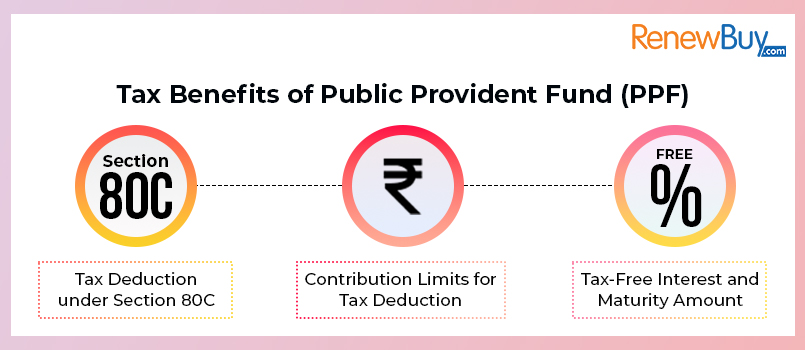Public Provident Fund (PPF) is a popular investment option in India that offers attractive returns and tax benefits. It is a long-term savings scheme launched by the Government of India to encourage individuals to save for retirement while enjoying tax benefits. In this article, we will explore the taxation aspects of PPF as a tax-saving investment.
Public Provident Fund (PPF) for Tax Savings

Tax Benefits of Public Provident Fund (PPF)
Public Provident Fund (PPF) offers several tax benefits to individuals, making it an attractive investment option for tax planning. Let's explore the key tax benefits of Public Provident Fund (PPF) for Tax Savings:
- Tax Deduction under Section 80C: Investments made in the Public Provident Fund (PPF) account are eligible for tax deduction under Section 80C of the Income Tax Act, 1961. The maximum deduction allowed under section 80C is INR 1.5 lakh per financial year. This means that the amount invested in the PPF account up to the maximum limit can be deducted from the taxable income, thereby reducing the tax liability.
- Contribution Limits for Tax Deduction: The minimum annual contribution required to keep a PPF account active is INR 500, and the maximum is INR 1.5 lakh. Any amount deposited within this limit is eligible for tax deduction under section 80C. Additionally, account holders can contribute to their PPF account in a lump sum or multiple instalments.
- Tax-Free Interest and Maturity Amount: The interest earned on the PPF account is tax-free. The interest rate is set by the government and is compounded annually. The interest rate was around 7.1% annually. The interest earned on the PPF account is exempt from income tax and is not considered taxable income.

Understand Tax Savings Under PPF through Example
Suppose your annual income is INR 9 lakhs. Your tax benefits, with or without deductions under section 80C exclusive to PPF, will be as follows:
| Income | With deductions | Without deductions |
|---|---|---|
| INR 9 Lakhs | INR 9 Lakhs | INR 9 Lakhs |
| Exempted income | INR 7 Lakhs | INR 7 lakhs |
| Taxable income | INR 2 Lakhs | INR 2 Lakhs |
| Deductions u/s 80C | INR 1.5 Lakhs | - |
| Income tax (@ 10%) | INR 5,000 | INR 20,000 |
| Cess (@ 3%) | INR 800 | INR 800 |
| Net tax | INR 5,800 | INR 20,800 |
So, as per the new income tax regime, investing in the Public Provident Fund (PPF) scheme, you can save INR 15,000 in income tax every year.
Conclusion
The Public Provident Fund (PPF) is a reliable and tax-efficient investment option for individuals looking to save for the long term and avail of tax benefits. With its competitive interest rates, government backing, and flexibility in contributions and withdrawals, PPF remains a popular choice among investors. By understanding the features, tax benefits, and account management aspects of PPF, individuals can make informed decisions to maximize their tax savings and build a secure financial future. It is advisable to consult with a financial advisor to determine the suitability of PPF based on individual financial goals and circumstances.
Related Article

A Comprehensive Guide to.....

Income Tax Login

Section 10 of Income.....

Difference Between Old and.....

National Pension Scheme: Eligibility,.....

A Complete Guide to.....

National Pension Scheme.....

Tax Savings Under Section.....
